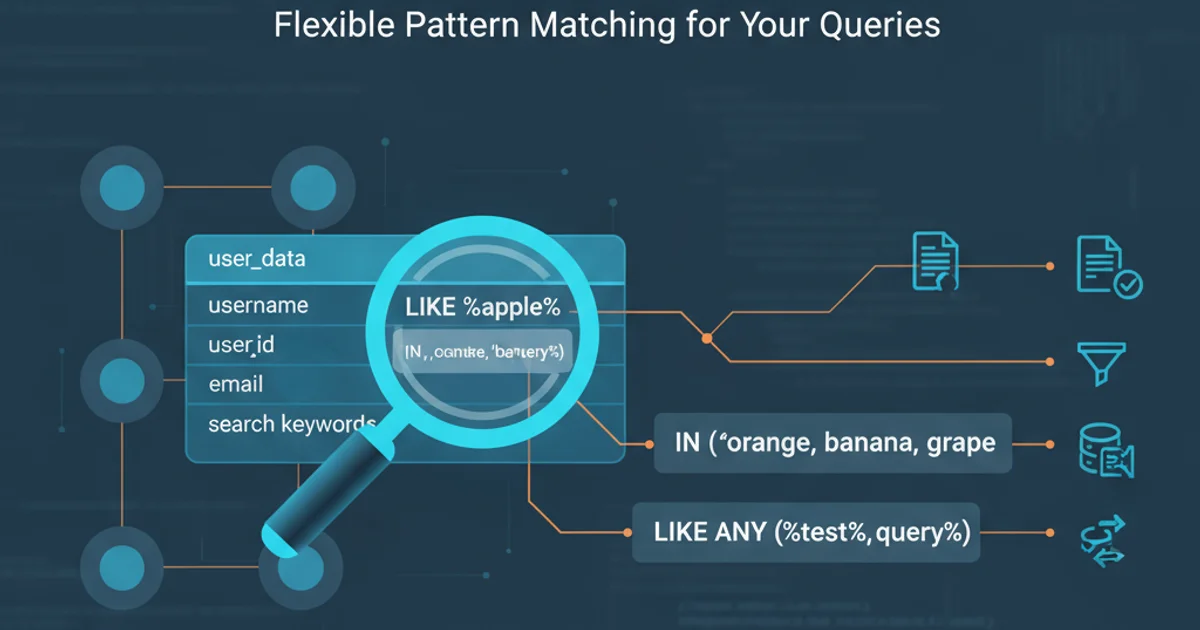MySQL LIKE IN()?
Mastering MySQL's LIKE with IN() for Flexible Pattern Matching

Explore how to combine MySQL's LIKE operator with the IN() clause to perform powerful, multi-pattern searches, overcoming common SQL limitations and enhancing data retrieval flexibility.
In MySQL, the LIKE operator is a fundamental tool for pattern matching in string columns. It allows you to search for values that match a specified pattern using wildcard characters. However, a common challenge arises when you need to search for a column that matches any of several different patterns. While LIKE is powerful for a single pattern, directly combining it with IN() in the way you might expect (e.g., column LIKE IN ('%pattern1%', '%pattern2%')) is not supported in standard SQL or MySQL.
This article will delve into the reasons behind this limitation and, more importantly, provide effective strategies and alternative syntax to achieve the desired multi-pattern LIKE search functionality. We'll cover using OR conditions, regular expressions (REGEXP), and other techniques to empower your MySQL queries.
Understanding the Limitation: Why LIKE IN() Doesn't Work
The IN() operator in SQL is designed to check if a value is equal to any value within a specified list of exact values. For example, column IN ('value1', 'value2') works perfectly. The LIKE operator, on the other hand, expects a single pattern string as its right-hand operand (e.g., column LIKE '%pattern%').
When you attempt to combine them as column LIKE IN ('%pattern1%', '%pattern2%'), MySQL interprets IN ('%pattern1%', '%pattern2%') as a boolean expression or an invalid operand for LIKE. The LIKE operator simply isn't built to iterate through a list of patterns provided by IN() and apply itself to each one individually. This fundamental difference in how IN() and LIKE operate is why a direct combination fails.
flowchart TD
A[Start Query] --> B{Is `LIKE IN()` supported?}
B -- No --> C[Error / Invalid Syntax]
B -- Yes (Hypothetical) --> D[Process each pattern in IN()]
D --> E{Apply LIKE to column for each pattern}
E --> F[Combine results with OR]
C --> G[End Query]
F --> GConceptual flow of why direct LIKE IN() fails
Solution 1: Using Multiple OR Conditions
The most straightforward and widely compatible way to achieve multi-pattern LIKE matching is to explicitly list each LIKE condition separated by OR. This approach is easy to understand and works across virtually all SQL databases, including MySQL.
SELECT *
FROM products
WHERE product_name LIKE '%shirt%'
OR product_name LIKE '%trousers%'
OR product_name LIKE '%jeans%';
Using multiple OR conditions for multi-pattern LIKE search.
OR conditions can make your query long and less readable if you have a large number of patterns. It can also sometimes impact performance, especially without proper indexing.Solution 2: Leveraging Regular Expressions with REGEXP
MySQL provides the REGEXP (or RLIKE) operator for more advanced pattern matching using regular expressions. This is an extremely powerful tool for searching against multiple patterns, as regular expressions allow you to define complex search criteria within a single string.
To search for multiple patterns, you can use the | (OR) operator within your regular expression. For example, '%pattern1%|%pattern2%' would match either 'pattern1' or 'pattern2' anywhere in the string.
SELECT *
FROM products
WHERE product_name REGEXP 'shirt|trousers|jeans';
Using REGEXP for multi-pattern matching. Note that REGEXP implicitly searches for the pattern anywhere in the string, so leading/trailing wildcards are often not needed unless you want to anchor the match.
LIKE for simple patterns, especially on large datasets, as it typically cannot utilize indexes as effectively as LIKE (unless specific full-text indexes are in place and configured for regex, which is rare for simple REGEXP). Use REGEXP when the complexity of the patterns justifies the potential performance overhead.Solution 3: Dynamic Query Construction (Application Layer)
For scenarios where the list of patterns is dynamic and comes from an application, it's often best to construct the OR conditions programmatically in your application code. This prevents SQL injection vulnerabilities if patterns are user-supplied and keeps your SQL clean.
Here's a conceptual example in a pseudo-code format, demonstrating how an application might build such a query:
Python Example
patterns = ['%shirt%', '%trousers%', '%jeans%'] conditions = [f"product_name LIKE '{p}'" for p in patterns] sql_query = f"SELECT * FROM products WHERE {' OR '.join(conditions)};" print(sql_query)
Output: SELECT * FROM products WHERE product_name LIKE '%shirt%' OR product_name LIKE '%trousers%' OR product_name LIKE '%jeans%';
PHP Example
$patterns = ['%shirt%', '%trousers%', '%jeans%']; $conditions = []; foreach ($patterns as $p) { $conditions[] = "product_name LIKE '" . addslashes($p) . "'"; } $sql_query = "SELECT * FROM products WHERE " . implode(' OR ', $conditions) . ";"; echo $sql_query; // Output: SELECT * FROM products WHERE product_name LIKE '%shirt%' OR product_name LIKE '%trousers%' OR product_name LIKE '%jeans%';
addslashes() in PHP or database-specific functions) when constructing SQL from user input to prevent SQL injection attacks.Performance Considerations
When choosing between OR conditions and REGEXP, performance is a key factor. For a small number of simple LIKE patterns, the OR approach is generally faster as it can sometimes utilize indexes (especially if the wildcard is not at the beginning of the pattern, e.g., product_name LIKE 'shirt%').
However, for a very large number of patterns or complex pattern matching requirements, REGEXP might be more concise, but its performance overhead should be carefully evaluated. For extremely large datasets and complex text searches, consider full-text indexing solutions like MySQL's built-in FULLTEXT indexes or external search engines like Elasticsearch.
EXPLAIN to understand their execution plan and identify potential bottlenecks, especially when dealing with large tables or complex WHERE clauses.